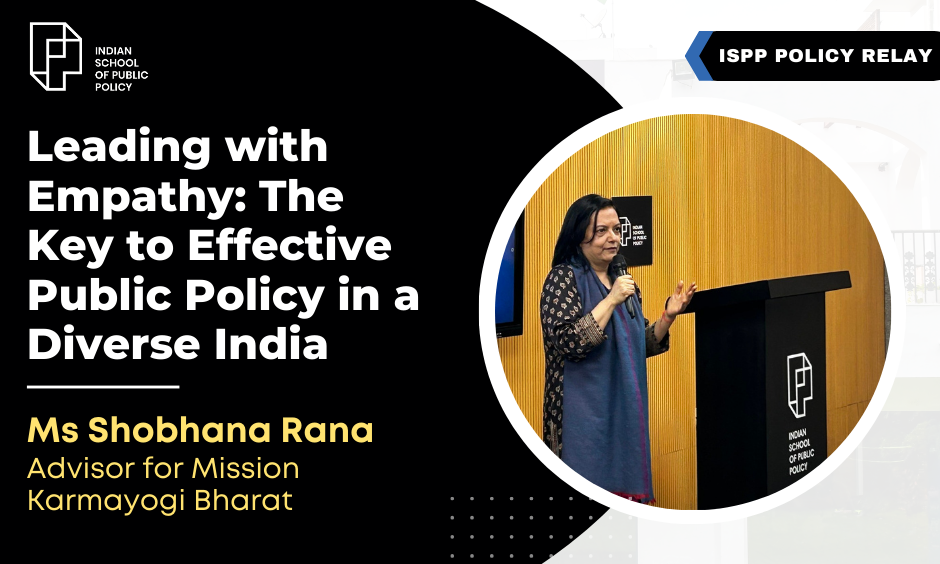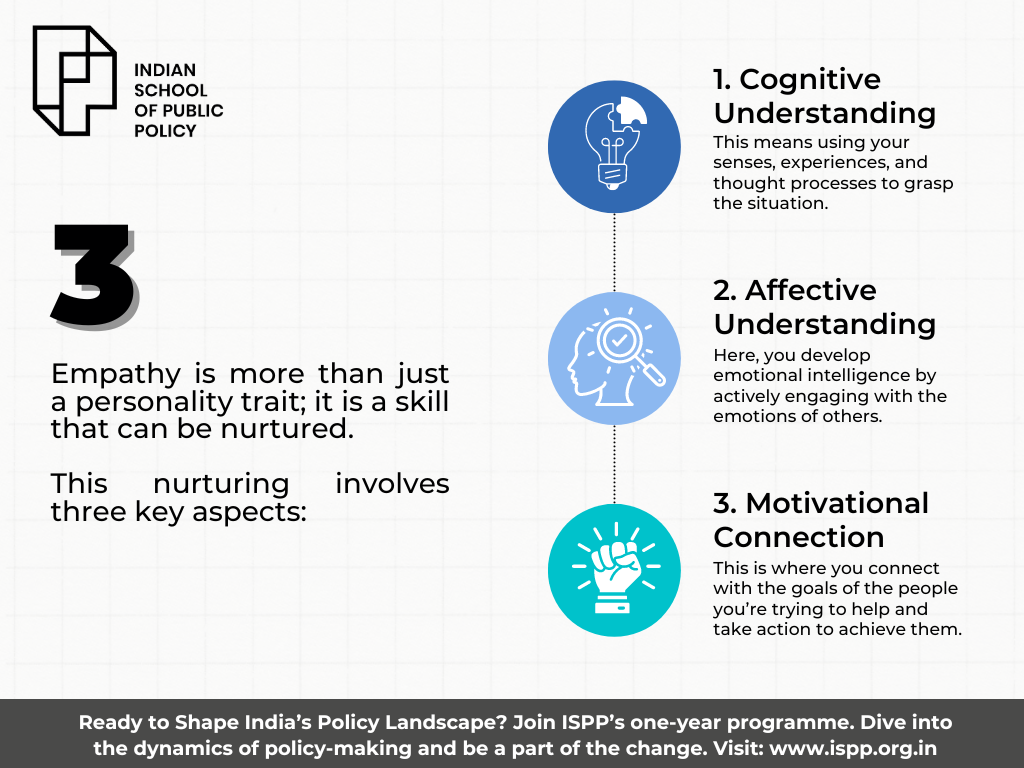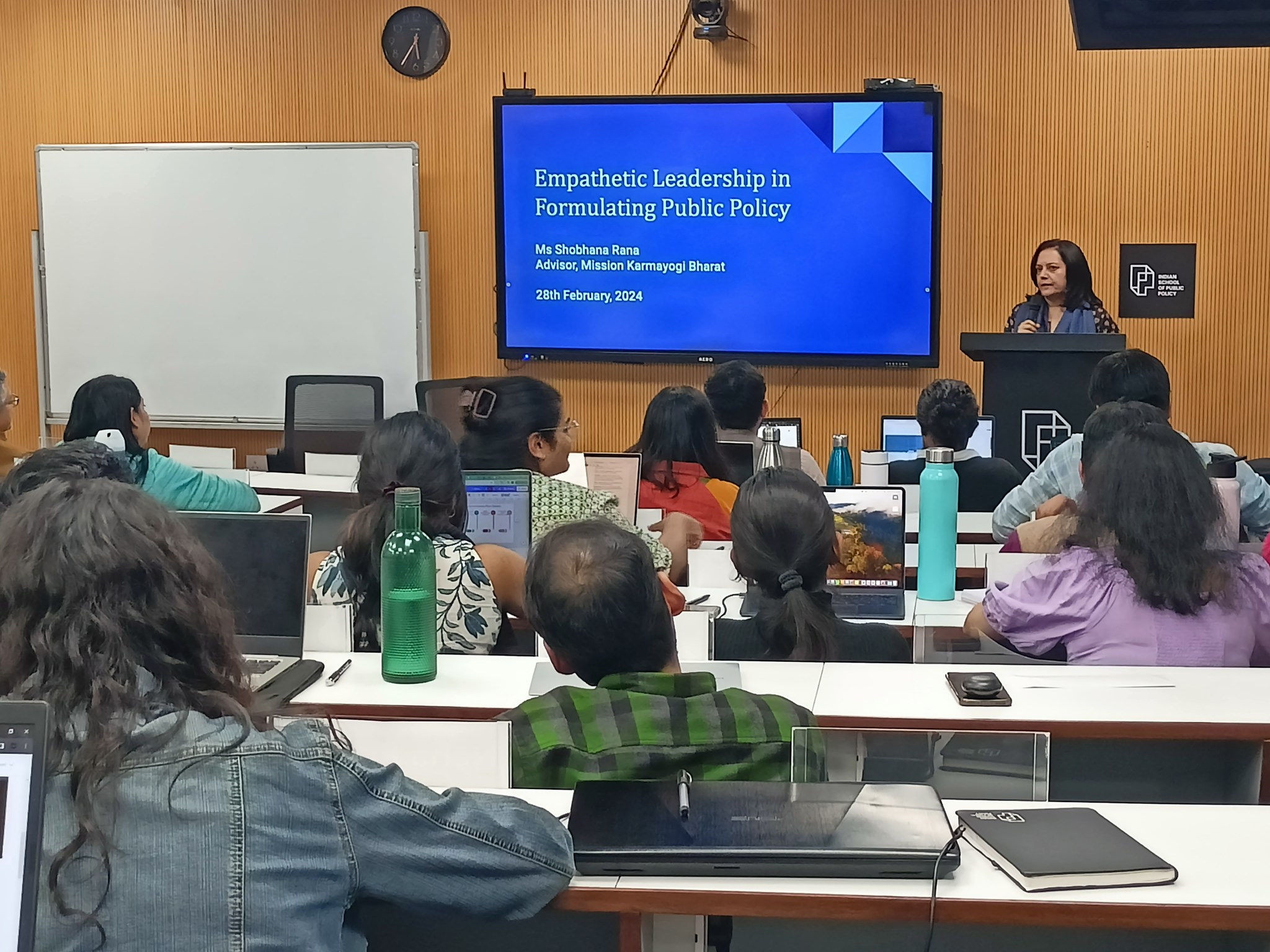
Leading with Empathy: The Key to Effective Public Policy in a Diverse India | Shobana Rana

India’s ambitious vision of becoming a developed nation by 2047, ‘Viksit Bharat @ 2047’, hinges on sound public policymaking. These policies are the building blocks that shape society, promote progress, and, ultimately, the common good. However, for these policies to succeed, we need leaders who understand the people they serve and practice empathetic leadership.
Public policy is a set of laws, regulations, and actions designed to achieve specific social and economic goals. However, crafting effective policy requires a clear understanding of the problems. Here’s where things get tricky in India’s vast and diverse landscape. Problems vary significantly from region to region, each with a unique geography and cultural context. This is precisely why empathetic leadership is crucial in formulating public policy.
But what does Empathy mean? It is the ability to step into someone else’s shoes and see the world from their perspective. It is more than just a personality trait; it is a skill that can be nurtured. This nurturing involves three key aspects:
- Cognitive Understanding: This means using your senses, experiences, and thought processes to grasp the situation.
- Affective Understanding: Here, you develop emotional intelligence by actively engaging with the emotions of others.
- Motivational Connection: This is where you connect with the goals of the people you’re trying to help and take action to achieve them.
So, what does it take to be an empathetic leader? It is about actively listening to the concerns of your colleagues, subordinates, and, ultimately, the citizens you serve. It is about building open, compassionate communication and a transparent work culture. Think Mahatma Gandhi, Nelson Mandela, and Martin Luther King Jr.—leaders who resonated with the aspirations of their people and mobilised them through their empathy.
However, empathy needs direction. It must be coupled with a well-defined strategy and plan of action. This calibration ensures your emotions guide you towards achieving goals, not leading you astray. Effective, empathetic leaders maintain healthy boundaries to ensure their actions are relevant and impactful. Self-awareness is critical—understanding the power of your position and its impact on many lives.
If empathy plays such a critical role in leadership, how does it matter in public policy? Empathetic leadership in public policy allows you to understand the local aspirations of the people and the problems they face. This ensures policies are designed with the needs of the people in mind rather than a top-down approach that forces solutions. This is the essence of the word “public” in public policy, which focuses on the needs and voices of the citizens for whom the policy is designed. An example of empathetic policymaking is the Ayushman Bharat scheme, the world’s most extensive health insurance programme. This programme aims to provide health coverage of Rs. 5 lakh per family per year for secondary and tertiary care hospitalisation to over 12 crore poor and vulnerable families. By increasing healthcare accessibility, reducing out-of-pocket expenditure, and offering portability of benefits, the scheme prioritises user-friendliness.
The absence of empathy can render policies ineffective and even lead to wastage of resources. We see this in projects undertaken by some international organisations, where policies designed for developing countries are formulated in distant headquarters with little understanding of the ground realities. In India, this has been evident in tribal health programmes, which were often seen as mere extensions of rural health programmes, neglecting the unique needs and contexts of tribal communities. Such a lack of empathy leads to programmes that fail to address local issues and ultimately fail to deliver.
Empathetic leadership is the cornerstone of effective public policy in a diverse nation like India. India’s journey to ‘Viksit Bharat’ is a collective effort. We need leaders at all levels, from policymakers to community leaders, to embrace empathetic leadership. Let us bridge divides, listen to the unheard, and work together to design policies that empower every citizen. By fostering empathy, we can pave the way for a brighter, more inclusive future for all.
Infographic:

Interested in gaining such expertise?
Check this out!
The Indian School of Public Policy
The Indian School of Public Policy (ISPP) is a collaboration of top policymakers, experts, and influencers. It aims to transform policymaking by connecting with industries, having a globally renowned faculty, and adopting an innovative approach. The flagship offering is the Post Graduate Programme in Public Policy, Design, and Management, a year-long course divided into seven terms, each lasting seven weeks. This immersive programme empowers students to understand public policies deeply, equipping them with the skills needed to excel as proficient policy analysts and executives. The course covers key areas like public policy, finance, ethics, and public administration.
Programme Objectives
During the programme, students analyse policies, create new ones, and learn how to make a real-world impact. They consider factors like financial feasibility, necessary skills, and ethical principles. The programme focuses on finding the best strategies for implementing policies, efficient management, and thorough evaluation in the field of public administration and policymaking.
Take a peak into the class profile 2023.
Check out the PDM programme highlights!
- Harris Uchicago – Certificate In Public Policy
- Immersive Learning Projects
- Interactive Labs
- Career Support & Placements
- Tea & Policy
Register your Interest to Study at ISPP
Shobana Rana with ISPP Scholars


Omkar Dhanke
PDM Scholar, Class of 2024
Omkar Dhanke, graduated in Bachelors in Technology (Food Technology) in year 2020, from MIT, Pune. Always socially conscious, got himself enrolled in National Service Scheme (NSS) to work for people. His research and analysis skill are very well evident from the fact that he has published two research papers during graduation. Poster Presentation, Event Management, Public Speaking reflect his managerial and presentation skills. Post the graduation, while preparing for civil services, he started analyzing things around himself from the perspective of governance, social justice, ethics in governance, which made know and understand the critical role of public policy and policy makers in the governance of country. This made him realize the need to pursue career in Policy Design and Management.

